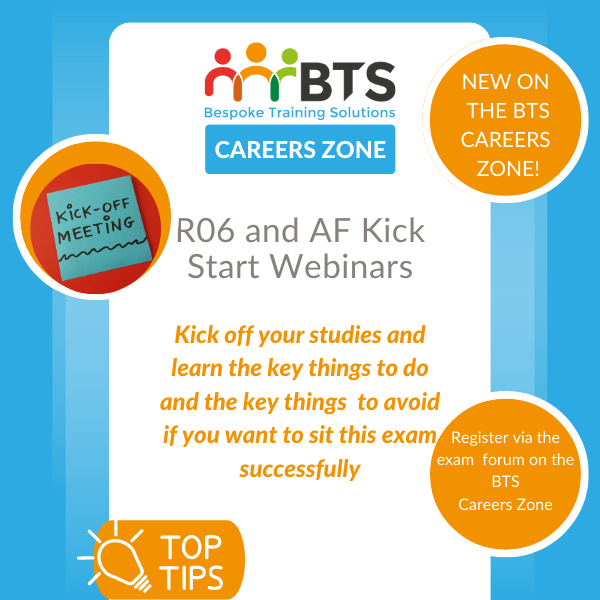BTS get asked lots of questions about the Financial Planning Practice exam. We have been supporting candidates to pass the R06 exam since the very first exam sitting. In this article we have answered the common questions asked by candidates and share our top tips on how to increase your chances of securing a pass in the CII R06 exam.
What is the R06 exam like?
The R06 exam is often the final exam attempted by candidates working towards the CII Diploma is Regulated Financial Planning. It is the only ‘written’ exam of the Diploma and it takes a very different format to the R01 to R05 exams.
R06 is a written, case study exam. It tests both your technical knowledge and your application skills. Your performance in this exam is used by the examiner to assess how well you apply your knowledge of the financial planning process in two hypothetical client-facing scenarios.
The R06 exam tests your skills – the way you approach the questions demonstrates how well you can apply your financial planning knowledge from the other units in the Diploma.
CII Assessment Information
- This is a 3-hour written exam based on two case studies. Case studies are released two weeks prior to the exam sitting, the questions are unseen until the sitting itself.
- Answers are typed onto a screen, not hand-written.
- The nominal pass mark for the R06 exam is 55%
- There are 150 marks available on the paper, therefore 82 marks are required to pass
- The marking is positive, meaning you will not have marks deducted for wrong answers
- The CII national pass rate for the R06 in 2020 was 78%
- Currently, candidates can choose to sit the exam remotely or in an exam centre
How should you study to pass the R06 exam?
Your preparation for the R06 exam should be split into two parts:
- What you can do before you have seen the case studies
- What you can do after the case studies have been released
You could be forgiven for thinking that the R06 is an easy exam, as the case studies are available a full two weeks before the sitting. However, the national pass rate for this exam fluctuates year on year and has recently been as low as 67% in 2019. The CII recommend 100 study hours for this exam, twice as many hours as R03!
You can’t leave your preparation until two weeks before the exam and expect to pass! So, what can you do to prepare in the time before the case studies are released?
- Study an R06 study text – you have no choice but to purchase the CII R06 study text as part of your exam enrolment, which is a bit frustrating. BTS produce a much more learner-friendly version of the R06 study guide which covers all the same information in a more accessible way. Check out a free sample of the BTS R06 Study Guide here, it really will help you to organise your study and check your knowledge ahead of the case studies being released.
- Revise the core technical knowledge areas from across the Diploma syllabus. As you work through your R06 study guide, make a note of any gaps in your knowledge. Ask yourself how confident you are on each of the areas that might come up. This is the time to revisit your old study guides, don’t wait until you see the case studies to realise that your knowledge of defined benefits schemes isn’t as good as it should be!Remember, the core units in the Diploma are:
-
- Financial services, regulation and ethics;
- Investment principles and risk;
- Personal taxation;
- Pensions and retirement planning;
- Financial protection.
- Attempt as many past papers as possible. You can access the full examiner’s report for each of the papers from the previous four sittings on the CII website. BTS suggest you aim to sit one past paper per week, first attempting the questions as if it were your real sitting and then comparing your answer to the examiner’s report to identify where you are gaining and losing marks.
Analysing the case studies
On the day the case studies are released you need to be ready to focus in on the key facts that are presented in each client scenario. There will be two case studies, describing the unique financial circumstances of two different couples.
The R06 exam is an opportunity for you to demonstrate your application of the process undertaken to obtain appropriate client information and understand a client’s needs, wants, values and risk profile. Each case study usually presents 3-5 financial aims. The first step in your analysis is to identify and explore what these aims are.
Pick out the key facts presented in the client information and identify the client’s financial aims.
Next, you need to formulate suitable plans to meet the financial aims of the case studies, remembering to include an explanation and justification for any recommendations that you would make.
Finally, consider how you would implement and review the financial plans.
How can you anticipate the questions on the paper?
No one can accurately predict all the questions that will come up, but there are ways to prepare for as many different question angles as possible by;
- looking at past papers to see what sorts of questions have come up before
- reading the examiner’s reports from past papers to find out what they are looking for in an answer
- referring to the learning outcomes in the syllabus, what sort of questions could these link to?
- using a case study analysis such as the one produced by BTS, these contain dozens of specimen questions relating to the specific case studies for the exam
How does the BTS Case Study Analysis e-Learning module help you prepare to pass the R06 exam?
- The BTS analysis e-Learning module
- identifies the key facts in the case studies
- gives you a range of possible specimen questions for each case study plus BTS specimen answers
- gives you hints and tips on how to approach specific question styles
- includes crib sheets and aide memoirs, graphics and tables on key technical knowledge
- How should you use an analysis?
- Have a go at answering the specimen question yourself before comparing your answer to the specimen answer
- Reflect on your answer, where did you pick up and lose marks?
- Read the hints and tips on how to approach that type of question in the exam
- Develop your analysis skills so that you can answer whatever the CII throw at you!
- What is it not for?
- It is not an exhaustive list of questions to be learned by rote.
- An R06 exam pass is not achieved by learning a set of questions and answers. You need to use the specimen questions to reflect on your question answer technique so that you can apply these techniques to any question that comes up.
Take a look at the video demo of the BTS April 2021 R06 Case Study Analysis e-Learning resource below!
R06: The exam centre experience & what to expect












